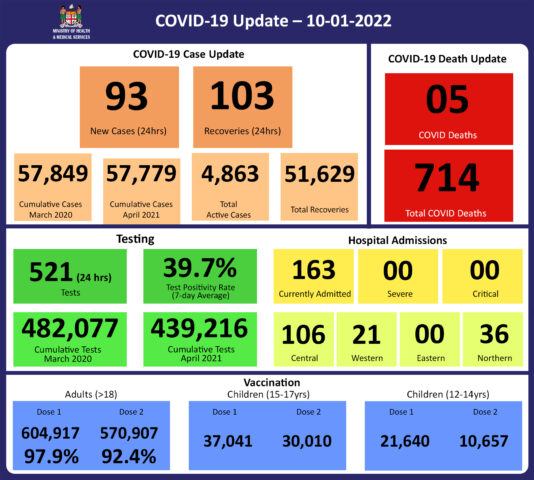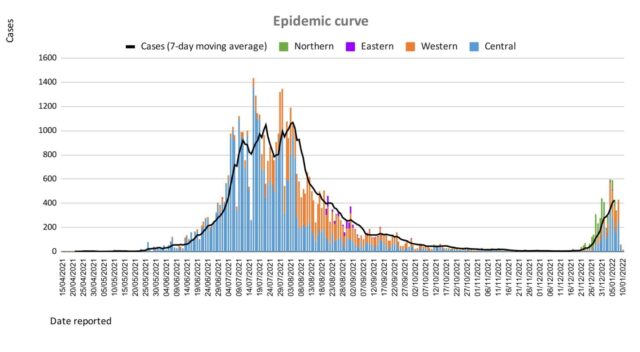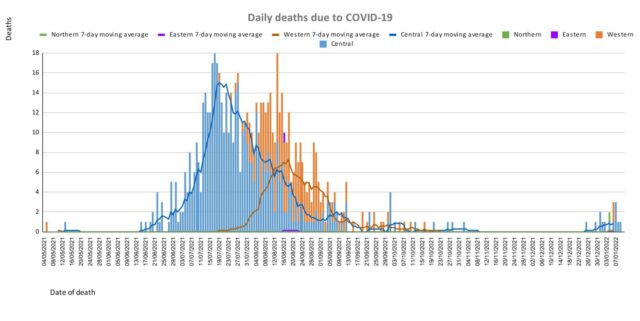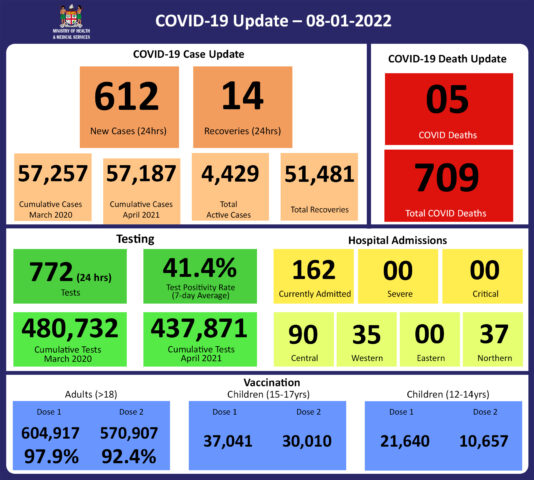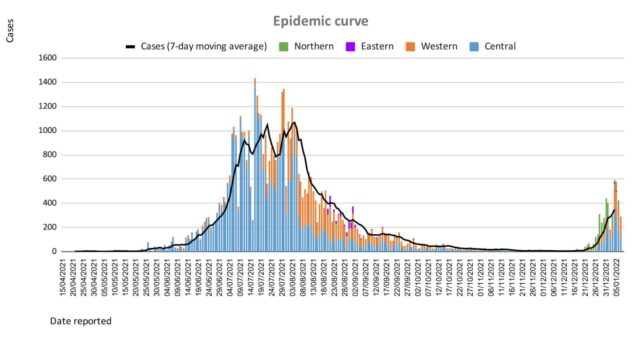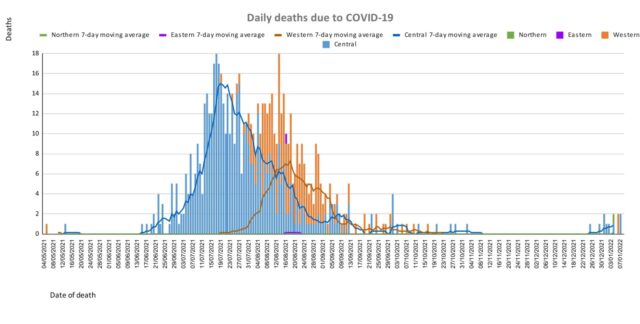COVID-19 Situation Update
Monday 10th January 2022
| Transmission Update:
Since the last update on 08/01/2022, we have recorded a total of 461 new cases; of which 368 new cases were recorded on 09/01/2022, and 93 new cases in the last 24 hours ending at 8 am this morning. The drop in positive cases reported in the last 24 hours is likely due to a decrease in people being tested at health facilities due to adverse weather conditions. Of the 461 cases recorded since the last update, 245 cases were recorded in the Central Division; 202 cases were recorded in the Western Division, 14 cases were recorded in the Northern Division, and nil cases in the Eastern Division. Overall, there have been 57,779 cases recorded, with 69% of the cases from the Central Division, 27% of the cases from the Western Division, 1% of the cases from the Eastern Division, and 3% from the Northern Division. Our national 7- day rolling average is 426 daily cases calculated for 6th January 2022. |
| Deaths:
This curve depicts the daily death count by division since the 2nd wave of this outbreak that began in April 2021. Overall, the death rates for the Central, Western, and Northern Divisions indicate an upward trend. There are five COVID-19 deaths to report. The first COVID-19 death to report is of a 63-year old female from Tagitagi, who died on arrival at Tavua Hospital on 06/01/2022. She had significant pre-existing medical conditions which contributed to her death. She received her first dose of the COVID-19 vaccine in mid-July and the second dose in mid-September. She was fully vaccinated. The second COVID -19 death to report is of a 75-year-old male from Nausori who died at home on 06/01/2022. He was not vaccinated. The third COVID-19 death to report is of a 66-year old male from Suva who died at home on 07/01/2022. He received his first dose of the COVID-19 vaccine at the end of July. He was not fully vaccinated The fourth COVID-19 death to report is of a 52-year-old male from Rewa, who died at home on 08/01/2022. He had a pre-existing medical condition, received his first dose of the COVID-19 vaccine in mid-April and the second dose in mid-August. He was fully vaccinated. The fifth COVID-19 death to report is of a 73-year-old male from Suva who died at home on 09/01/2022. He had multiple pre-existing medical conditions, had received his first dose of the COVID-19 vaccine in mid-June and the second dose in mid-August. He was fully vaccinated. There have been a total of 714 deaths due to COVID-19 in Fiji. Please note that due to the time required by clinical teams to investigate, classify and report deaths, a 4-day interval is given to calculate the 7 days rolling average of deaths, based on the date of death, to help ensure the data collected is complete before the average is reported. Therefore, as of January 6th, 2022, the national 7 days rolling average for COVID-19 deaths per day is 1.4, with a case fatality rate of 1.32%. We have recorded 641 COVID-19 positive patients who died from serious medical conditions they had before they contracted COVID-19; these are not classified as COVID-19 deaths. |
Hospitalisation:
Using the WHO clinical severity classification, a greater percentage, 86% (n=140) of the admissions of COVID-19 positive patients are categorized as asymptomatic and mild, 9% (n=14) are categorized as moderate and 5% (n=9) as severe. Anyone admitted to the hospital is tested before admission, therefore, a significant number of people are admitted to the hospital for non-covid health conditions, but incidentally, test positive due to the high amount of transmission in the community. The number of people being admitted because of COVID-19 remains low.
Testing:
521 tests have been reported for January 9th, 2022. The 7-day daily test average is 830 tests per day or 0.9 tests per 1,000 population.
The national 7-day average daily test positivity is 39.7%. The high positivity rate is an indication of widespread community transmission and that the cases reported are a significant underestimate of actual numbers.
Public Advisory:
As we continue to record new cases of COVID-19 throughout the country, the public is reminded of the need to maintain public health and social measures that are helping in suppressing the transmission of the virus in our communities so that hospitalization numbers remain low. When a large number of people get infected within a shorter period of time, even a smaller percentage of people becoming severely ill may still mean a large number requiring hospitalization, which will put pressure on our health system. Strict adherence to the community-wide COVID safe measures by everyone will ensure that we will continue to function socially and economically while the community transmission of the disease is sufficiently suppressed.
The public is also reminded that for now, we are prioritizing our testing to individuals at higher risk of severe disease to ensure that they are assessed early, referred to an appropriate health care facility, and managed promptly if their symptoms deteriorate.
If you develop a cold or flu-like symptoms such as runny nose, sneezing, nasal congestion, sore throat, cough, body ache, fever, you should assume you have COVID-19, and self-isolate. If you have any of these symptoms, please stay home to avoid spreading the disease to others, and in particular those who may be more at risk of severe disease. Get tested at your nearest health facility if you are at higher risk of severe disease so that health workers may conduct an assessment and place you on a care pathway for monitoring and follow-up. You are at higher risk of severe disease if you are over the age of 50, or have any significant chronic disease like heart disease, kidney disease, lung disease, diabetes, hypertension, or you are obese or pregnant. If anyone in your home is at higher risk of developing severe disease, please try to isolate yourself away from them.
As announced yesterday, the isolation period has been reduced to 7 days. You may stop isolating if
1. 7 days have passed since the start of symptoms or since the positive test (for asymptomatic cases)
AND
2. Your symptoms are improving, and at least 24 hours have passed since you had a fever (without the need to take fever-reducing medications like paracetamol)
Also, as announced yesterday, close contacts of cases are no longer required to isolate unless they develop symptoms. If you are a close contact and develop symptoms you must assume you have COVID-19 and self-isolate as described. A close contact is anyone who lives in the same house as a positive case, or has been in a confined space for at least 1 hour, or has come within 2 meters, or has had any physical contact, in the 2 days before the case’s symptoms started and up to ten days after.
COVID safe measures in this 3rd wave
The public is advised that strict adherence to personal COVID safe measures is very important in this 3rd wave. Wear a well-fitted mask that covers your mouth and nose when you are in public places and when attending gatherings. Avoid crowds and poorly ventilated spaces. Maintain at least 2 metres of physical distancing from others when outside your home. Wash your hands frequently with soap and water or use an alcohol-based hand sanitiser. Stay home and do not attend any gatherings if you have any symptoms of COVID-19. Get vaccinated if you are eligible and have not yet been vaccinated. And get a booster dose if you are over the age of 18, and especially if you are at higher risk of severe disease.
Preparing for adverse weather events
While preparing for the adverse weather conditions, the public is reminded to also prepare well for their health needs. Those who take medications regularly for chronic illnesses should ensure that they have an adequate supply of medications with them. All medicines kept at home must be kept in waterproof containers and in dry places away from children and safe from the elements. Families should ensure that the health needs of the vulnerable members of the family such as pregnant mothers, babies and children, the elderly, and the disabled are considered carefully, and plans in place for their safe and immediate evacuation to a health facility if the need arises during a climatic event.
It is important to remember that weather disturbances also cause the increase of climate-sensitive diseases such as leptospirosis, typhoid fever, dengue fever, and diarrhoeal diseases. The public is advised to take actions to protect themselves from these diseases and to prevent the spread of the diseases in our community.
Drinking water should be boiled if the color of the water turns turbid or the regular water supply is frequently interrupted. Stored water should be covered to protect against dirt and pests. Compounds and the home surroundings should be cleared of loose materials and debris that can injure individuals and attract pests. Household rubbish should be disposed of properly, and proper personal protective equipment should be used when outside the household. Children should also be advised on the health risks associated with bathing in flooded water around the home, and in flooded drains, creeks, and rivers, and be discouraged from doing so.

